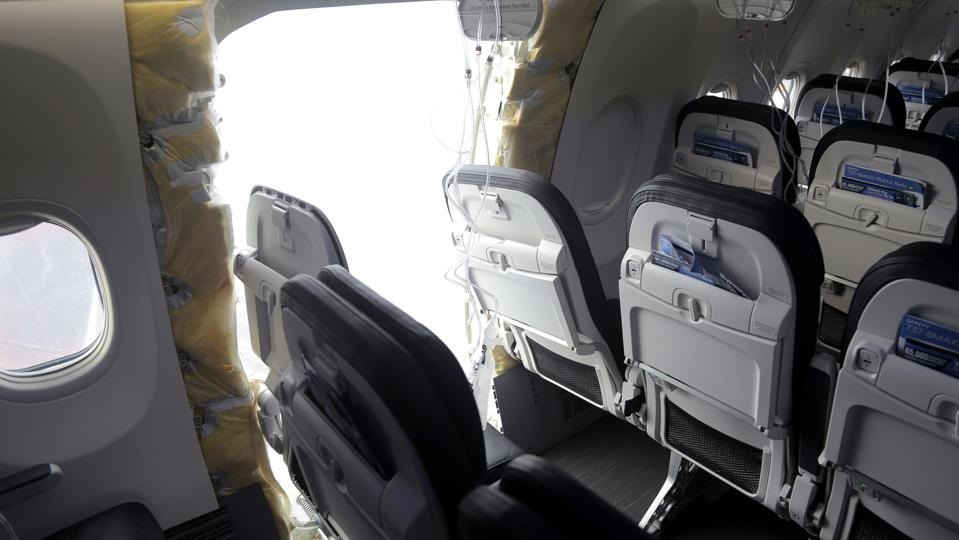


As per a Wall Street Journal report, the Justice Department of the United States of America has started an investigation into the January 5th mid-air door plug blowout incident of a Boeing 737 Max9 aircraft operated by the Alaska Airlines.
The news comes three days after National Transportation Safety Board officials accused Boeing of being uncooperative in their investigation into the matter. Chairwoman Jennifer Homendy said the aircraft manufacturer has not provided vital requested documents, while the company maintained that any records requested were either provided or do not exist.
Federal prosecutors have interviewed several witnesses in connection with the criminal investigation, including the pilots and aircrew of the Alaska flight, according to two individuals who spoke on the condition of anonymity because they are not authorized to speak publicly about the probe. A grand jury has been convened to examine evidence, one person said.
Alaska Airlines said in a statement Saturday that it was cooperating with the investigation.
“In an event like this, it’s normal for the DOJ to be conducting an investigation,” Alaska Airlines said. “We are fully cooperating and do not believe we are a target of the investigation.”
Spirit AeroSystems, a Boeing supplier that initially installed a panel that came off the jet in midair, said it has received requests for information from “multiple government agencies” and was cooperating with ongoing investigations.
The inquiry comes as an audit by the Federal Aviation Administration identified multiple instances where Boeing failed to comply with quality control requirements in its manufacturing process, an unwelcome reminder of safety problems that led to a 20-month grounding of the fleet following two fatal crashes involving 737 Max 8 jetliners in 2018 and 2019.
The Justice Department is investigating whether any factors that contributed to the Jan. 5 incident violated the terms of an earlier agreement with Boeing to resolve any criminal liability for the two crashes involving 737 Max jets, according to a person familiar with the probe.
Boeing reached that deal with the Justice Department in 2021 over employees’ concealment of a critical safety flaw implicated in crashes that killed 346 people in Ethiopia and Indonesia. Boeing agreed to pay more than $2.5 billion in penalties and admitted that two of its technical pilots deceived federal safety regulators about a software system blamed for the accidents.
As part of the agreement, Boeing would avoid criminal prosecution if it met other conditions for a period of three years, including promptly reporting any evidence that its employees or agents committed fraud against any government agencies, regulators or its customers. The company also agreed to strengthen its compliance program and to enhance compliance program reporting requirements.
The deal, known as a deferred prosecution agreement, also required Boeing to fully cooperate with any investigation by the fraud section of the Justice Department’s criminal division, including turning over upon request any evidence or allegations of violations or any related internal or external investigations.
The Justice Department stopped short of requiring the appointment of an independent monitor to ensure Boeing’s compliance, however, saying it did not believe one was needed.
Whether the causes of the door plug incident constitute a violation that 2021 agreement or lead to the discovery of new alleged offenses, or some combination of the two, appears to be an open question.
The Justice Department’s criminal division has until July 7 to decide whether to seek dismissal of the 2021 charges against Boeing, extend the probationary term by up to one year, or find the company in breach of the settlement. Such a finding could reactivate the prosecution.
The FAA has stepped up oversight of its manufacturing and quality control processes. The agency also has taken the unusual step of limiting the number of aircraft the company can produce until it can be assured that Boeing has addressed the problems that contributed to the Alaska Airlines blowout.
On Monday, the FAA said it had completed the audit and found multiple instances of Boeing and Spirit failing to adhere to quality control requirements. The agency said it has given Boeing 90 days to develop a plan to correct the problems.
According to the National Transportation Safety Board’s preliminary findings in the Jan. 5 incident, the door plug appeared intact when it left Spirit AeroSystems on Aug. 20. However, a photo shared by Boeing employees on Sept. 19 after it was removed for a repair shows three of four key bolts missing, with a fourth not visible in the picture.
Boeing said in a letter Friday to Sen. Maria Cantwell (D-Wash.) that it has searched for documentation about the removal of the part but has not discovered any records.
“We likewise have shared with the NTSB what became our working hypothesis: that the documents required by our processes were not created when the door plug was opened,” the company wrote. “If that hypothesis is correct, there would be no documentation to produce.”
Related News.....
